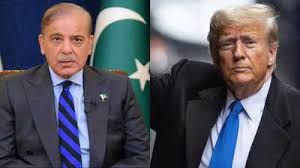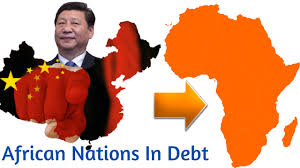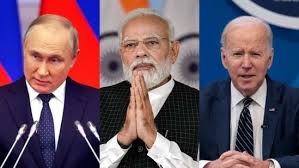A rich reward may be in the offing, possibly a leading role in Ukraine peace keeping force. It’s unlikely to have any major impact on US-India relations as they are much more matured and are based on shared values and larger geo-political goals.
by Ankineedu Prasad Nallapati*
While most countries are still struggling to cope up with President Trump’s vociferous `MAGA’ demands, Pakistan’s Army appears to have made a highly successful bid, quietly behind the glare of flashing lights, and the benefits of which are increasingly getting apparent.
Rawalpindi has played its `terror card’ once again, a highly calibrated technique that kept its Army in good stead in times of warming strained relations with the US.
There also appears to be a more tempting offer, dangling the prospect of opening relations with Israel, though official recognition can be delayed until after the Saudis lead the way. Trump said at a White House meeting on March 24 that “more and more” countries want to join the Abraham Accords to establish relations with Israel.
Last week, a delegation from Pakistan visited Israel, arranged by Sharaka, an NGO allegedly linked to Mossad funding, according to Pakistani social networks. The 10-member delegation of journalists and educators is said to be the largest such group to date to visit the Jewish state. They apparently promised to write positive articles on Israel.
These sources say that former Army Chief, Gen. Qamar Javed Bajwa, had also tried to build ties with Israel, as part of improving relations with the US, but met with fierce resistance from the then Prime Minister Imran Khan which is said to have been the reason for his ouster at American behest.
Pakistan is being richly rewarded by the Trump administration for these services, but the `Mother’ of `all Rewards’ is still to be announced, a possible role in Ukrainian peace process. We discuss it later in this report.
Rewards Galore
Trump, during his address to the Congress on March 5, praised Pakistan for capturing and handing over `wanted’ terrorist, Mohammad Shareefullah, an Afghan and operational commander of the Islamic State-Khorasan (IS-K), heralding revival of counter-terrorism cooperation between the two countries.
Shareefullah was behind the Abbey gate bombing at the Kabul airport that killed 13 American servicemen during their withdrawal from Afghanistan in 2021. Prime Minister Shehbaz Sharif claimed he was picked up from border areas of Afghanistan, but Taliban said that he was in Pakistan itself under its Army’s protection.
In another quick reversal of policy, the Trump administration has authorized $ 397 million for Pakistan for maintenance of its F-16 fighter jet fleet, which has been a long pending demand. The President had earlier stopped foreign aid to all countries after coming to power on January 20. The Pakistani aid is part of other exceptions that he has now allowed.
Extradition to India of Tahawwur Rana, a former Pakistani Army veteran involved in 26/11 Mumbai terrorist attack, was further delayed after his emergency appeal to the US Supreme Court on the same day as Shareefullah was being flown, even after the court had cleared his transport to New Delhi.
Trump himself announced on February 14 his immediate extradition to face justice in India. If it is further delayed, that would cast serious doubts on US commitments to India’s security.
The US has also lifted `bounties’ on Afghan Interior Minister Sirajuddin Haqqani, and his two relatives, who belong to the powerful pro-Pakistan Haqqani faction of the Taliban. Among several other terrorist acts, he acknowledged planning a January 2008 attack on the Serena Hotel in Kabul which killed six people including an American citizen.
It is a reward for Pakistan and not Taliban as there is no such relief for the reclusive chieftain of the group, Hibatullah Akhundzada.
There has been a growing rift between the two factions of the organization as relations between Taliban and Pakistan themselves nosedived amidst latter’s allegations of the Afghan government providing `safe havens’ to militant groups operating against Pakistan Army, like the Tehrik-e-Taliban Pakistan (TTP), Baluch Liberation Army etc.
The killing in December of Refugees Minister Khalil Haqqani, uncle of Sirajuddin, was seen as part of this factional fighting.
Denying the charges, the Taliban points finger at Pakistani support to IS-K, which continues to pose a threat to the Taliban. The IS-K claimed responsibility for a suicide bombing outside a bank in northern Afghanistan on February 11 that killed at least 14, including members of the group.
Shareefullah, who was handed over to the US by Pakistan Army, is a IS-K commander and operating under Rawalpindi’s watch. He was sacrificed by the Army for repairing ties with the US, a tactic that it has often used successfully.
Mother of All Rewards
The `Mother of All Rewards’ is said to be in the offing and may be announced after a peace deal, backed by the US, is reached between Russia and Ukraine. The US expressed hope that such a deal could be reached by April 20, though the two parties to the dispute are sceptical.
Pakistan appears to have been sounded for a lead role for `peace keeping’ in Ukraine. Both Ukraine and European powers want a European peace keeping force, but Russia and the US are in not inclined to oblige.
Pakistan Army is the sixth largest army in the world and the largest among the Muslim countries, but it is also seen as a `mercenary force’ that has long been used by various countries including the US, the UK and Arab countries, where they still serve their royal families.
Pentagon and the Pakistan Army and their intelligence services have always maintained close contacts even in times of political crises between the two countries.
The proposal to use Pakistani forces for peace keeping in Ukraine is likely to be acceptable to all parties, including Russia, Ukraine and even European countries. Relations between Russia and Pakistan have long been improving, including military cooperation.
The two navies last week carried out an exercise “Arabian Monsoon-VI” in the North Arabian Sea to enhance inter-operability of their forces and counter maritime security threats.
Pakistan also enjoys close military relations with Ukraine sourcing a substantial portion of its defense equipment from the besieged state.
Impact on India
Pakistan is obviously keen to use its `new found love’ with the US to its regional advantage against India.
It found an opportunity to make inroads into the new interim government of Bangladesh led by Prof. Muhammad Yunus, as the latter has an ax to grind against India giving asylum to deposed Prime Minister Sheikh Hasina.
Pakistani machinations are unlikely to impact India and its ties with the US as the relationship is much more matured and is based on shared values and larger geo-political goals. The US has long de-hyphenated its ties with India from the Islamic Republic.
The Trump administration, despite its trade disputes with India, appears to prefer to leave the sub-continent to New Delhi’s care.
President Trump’s transactional nature of dealings will allow limited room for Islamabad to meddle with other American interests.
(*Ankineedu Prasad Nallapati is President of the Hyderabad-based think-tank, “Deccan Council for Strategic Initiatives, and former Additional Secretary to Govt of India)




